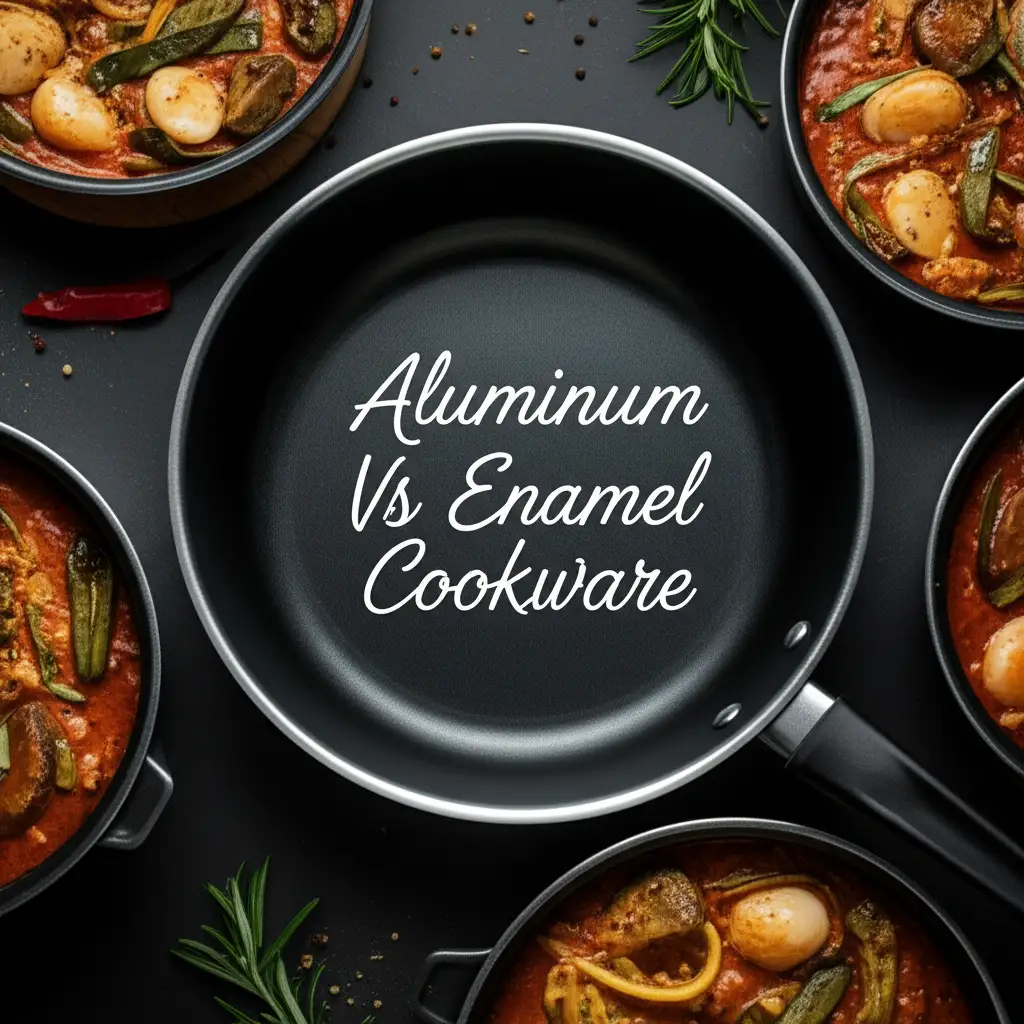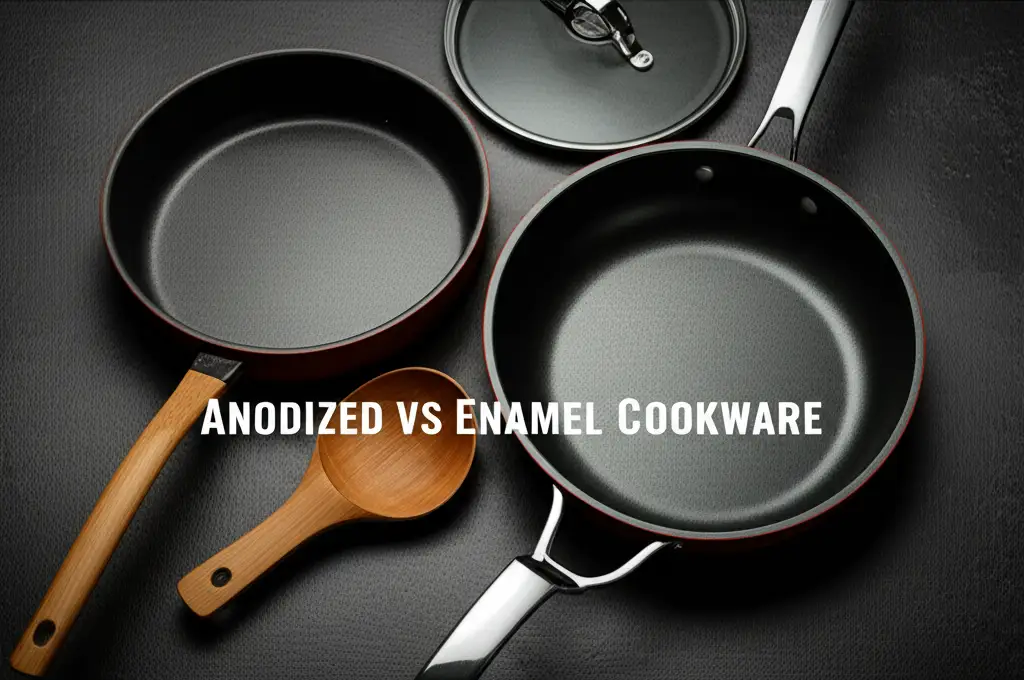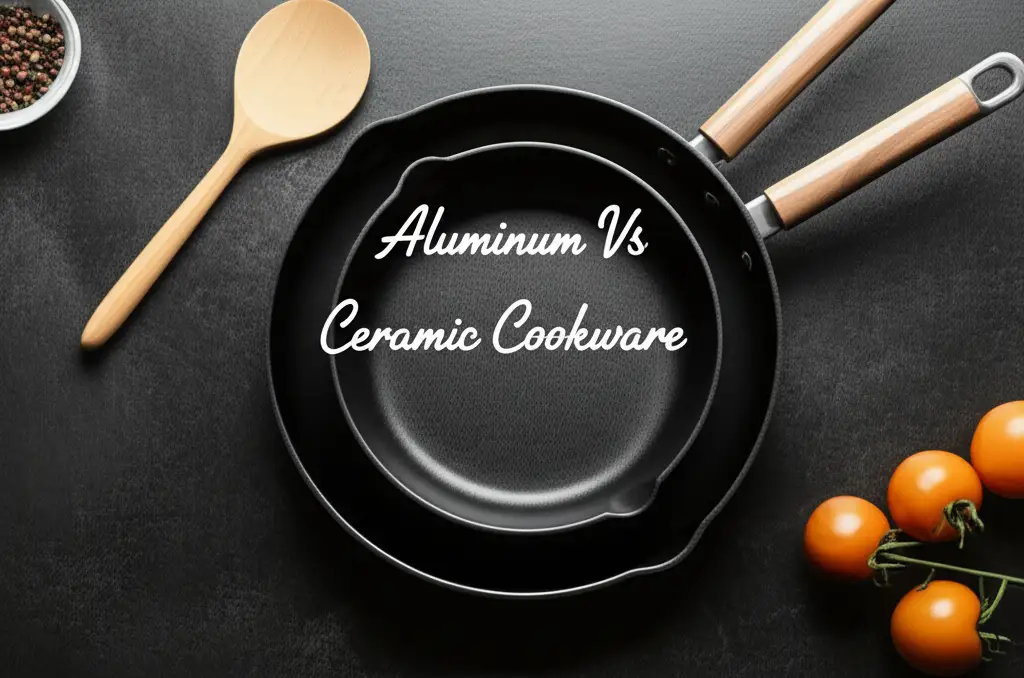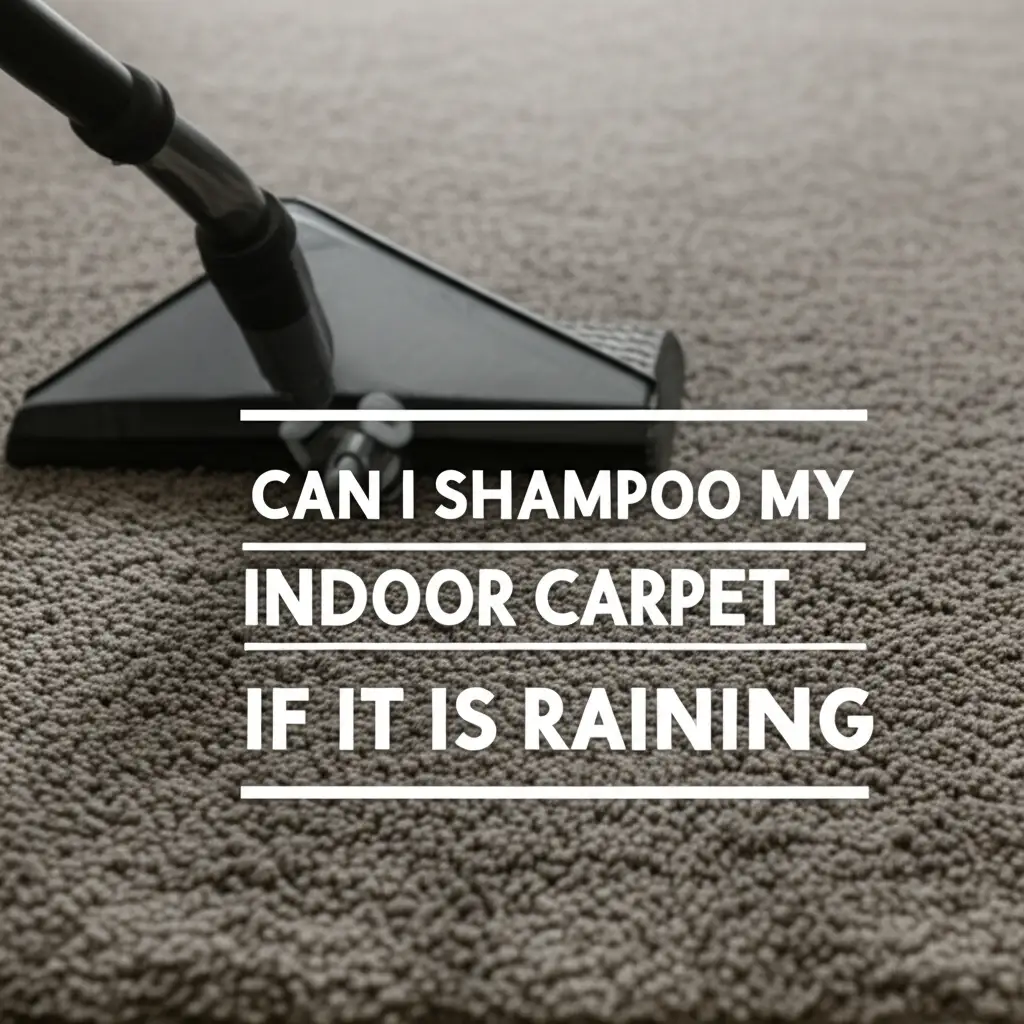· Elira Thomsen · Kitchen Essentials · 16 min read
Aluminum Vs Granite Cookware
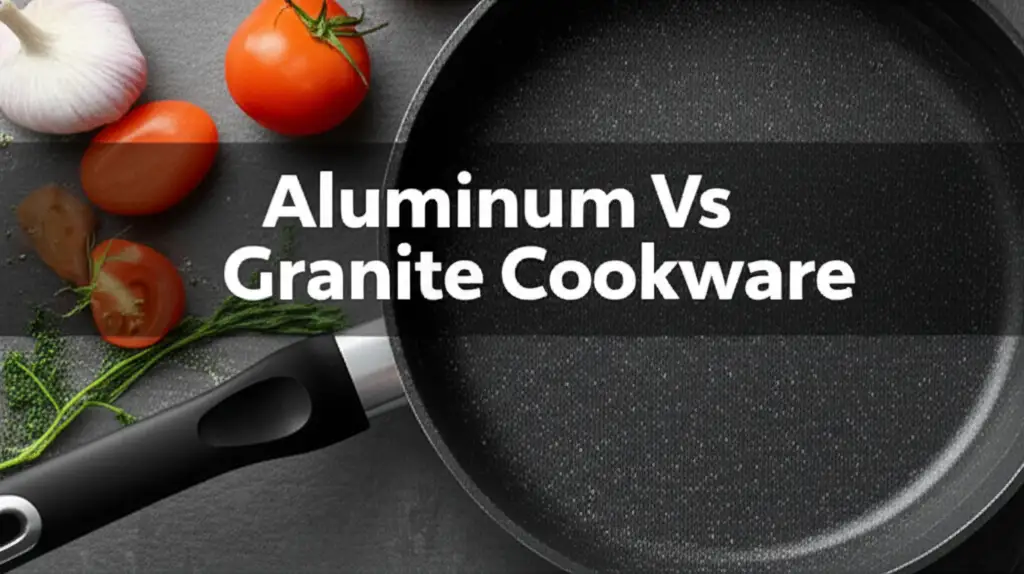
Aluminum vs Granite Cookware: Which is Best for Your Kitchen?
Choosing the right cookware can transform your cooking experience. People often face a big decision when selecting new pots and pans. Two popular choices stand out: aluminum and granite cookware. Each type offers distinct benefits and drawbacks for home chefs.
This guide will compare aluminum vs granite cookware in detail. We will look at their performance, durability, and safety aspects. My goal is to help you decide which material fits your cooking style best. Let’s explore these options to find the perfect set for your kitchen.
Takeaway:
- Aluminum cookware offers excellent heat conduction and is lightweight. It often comes at a lower price point.
- Granite cookware provides a non-stick surface and is highly durable. It also offers a safer, non-reactive cooking option.
- Your best choice depends on cooking needs, budget, and health priorities.
Aluminum cookware heats quickly and spreads warmth well, making it efficient for many tasks. Granite cookware, typically a steel core with a non-stick coating, offers durability and a non-reactive surface. Choose aluminum for quick, even heating on a budget, or granite for reliable non-stick and peace of mind.
Understanding Aluminum Cookware: Features and Benefits
Aluminum cookware is a common sight in kitchens worldwide. People use it for its many practical features. It offers a balance of performance and cost. This material provides distinct advantages for daily cooking tasks.
Raw aluminum is a soft metal. Manufacturers often anodize it or alloy it with other metals. This process makes it harder and more durable. Anodized aluminum cookware resists scratches better. It also prevents food from reacting with the metal.
Heat Conduction and Responsiveness
Aluminum is famous for its excellent heat conductivity. It quickly absorbs heat from the stovetop. This means your pans get hot fast. The heat spreads evenly across the cooking surface.
This even heating prevents hot spots. Food cooks uniformly without burning in one area. Aluminum also cools down fast when removed from heat. This quick response gives you precise control over cooking temperatures. For delicate sauces, this precision is a big plus.
Lightweight Design and Affordability
Cookware made from aluminum is surprisingly light. This makes it easy to lift and move around. You can comfortably handle large pots, even when they are full. Lightweight cookware is also simpler to store.
Aluminum cookware generally costs less than other materials. It is an affordable option for new cooks or budget-conscious shoppers. Its low price does not mean low quality in terms of heat performance. This accessibility makes it a popular choice for many households.
Safety and Reactivity
Concerns about aluminum leaching into food exist. Bare aluminum can react with acidic foods like tomatoes. This reaction can change the food’s taste. It might also cause tiny amounts of aluminum to transfer.
However, most modern aluminum cookware is anodized or coated. This protective layer prevents direct contact with the food. Anodization seals the surface, making it non-reactive. This makes the cookware safe for everyday use. Always check if your aluminum cookware is coated or anodized for safety.
Exploring Granite Cookware: Composition and Appeal
Granite cookware has gained significant popularity. Despite its name, it is not made from solid granite stone. It typically features a steel or aluminum core. This core is then coated with a speckled, non-stick enamel finish. This finish resembles the look of natural granite rock.
This multi-layer construction gives granite cookware its unique properties. The core provides strength and heat distribution. The coating offers a slick, easy-to-clean surface. This design aims to combine the best features of different materials.
Non-Stick Surface and Durability
The non-stick surface of granite cookware is a major draw. Food slides off easily, requiring less oil or butter. This feature promotes healthier cooking. It also makes cleanup quick and simple.
The enamel coating is usually chip and scratch-resistant. This adds to the cookware’s durability. It can withstand daily use without showing wear quickly. Many users find this cookware lasts a long time.
Aesthetic Appeal and Versatility
Granite cookware offers a distinctive and attractive appearance. Its speckled finish often comes in various colors. This allows it to complement different kitchen decors. Many people enjoy the modern look it brings to their cooking space.
This cookware is also quite versatile. You can use it on various stovetops, including induction. Most pieces are also oven-safe. This means you can start cooking on the stove and finish dishes in the oven. Some granite materials are incredibly tough. For example, granite is known for its hardness. This material is often used in kitchens. Think about granite countertops for example.
Health and Non-Reactivity
A key benefit of granite cookware is its non-reactive nature. The enamel coating acts as a barrier. This prevents any metal from touching your food. You can cook acidic foods without worrying about taste changes.
This coating is often free from harmful chemicals. Many brands ensure their products are PFOA and PTFE-free. This makes granite cookware a safer choice for many health-conscious cooks. It provides peace of mind while preparing meals.
Key Differences in Cooking Performance
When you choose cookware, how it performs matters most. Aluminum and granite cookware handle heat and interact with food differently. Understanding these differences helps you pick the right tool for your recipes. Your choice can affect the final taste and texture of your food.
I always consider cooking performance a top priority. Different dishes need different heating conditions. The material of your pan directly influences these conditions. Let’s look closely at how these two materials cook.
Heat Distribution and Retention
Aluminum excels at heat distribution. It heats up very quickly and evenly. This means the entire pan surface reaches the same temperature fast. Dishes like pancakes or stir-fries benefit from this uniform heat. However, aluminum loses heat just as quickly. It does not retain warmth well once removed from the burner.
Granite cookware, with its steel or aluminum core, also distributes heat well. It tends to hold onto heat longer than pure aluminum. This is good for dishes that need sustained, gentle cooking. Think about simmering sauces or braising meats. The even heat retention helps these foods cook thoroughly.
Browning and Searing Capabilities
Both types of cookware can achieve good browning. Aluminum’s quick heating allows for rapid searing. It quickly caramelizes the surface of foods. This creates a delicious crust on meats or vegetables. You can achieve high temperatures fast for effective searing. Aluminum cookware performs well in ovens. It heats up quickly. You might consider specific temperature needs, similar to how one evaluates air fryer temperatures for different foods.
Granite cookware, especially with its non-stick surface, may require slightly higher temperatures for strong browning. Its non-stick properties prevent food from sticking. This is great for delicate items. However, intense searing might be less pronounced than in bare aluminum or cast iron. Cookware surfaces interact differently with food. This affects browning and crisping. This can be as important as understanding the difference between air bake and air fry methods.
Oven and Stovetop Compatibility
Most aluminum cookware is stovetop safe. Whether it is oven-safe depends on the handles. If handles are plastic, they are not oven safe. Anodized aluminum pans without plastic handles can go into the oven. Always check the manufacturer’s instructions.
Granite cookware is often more versatile. Many pieces are designed for both stovetop and oven use. This includes electric, gas, and induction cooktops. This versatility makes it easy to transition dishes from stove to oven. Consider how your cookware fits with setups like an air fry oven versus a standard air fryer.
Durability, Maintenance, and Longevity
The lifespan of your cookware directly impacts its value. You want pans that stand up to daily use. Both aluminum and granite cookware have specific considerations for durability. Proper care ensures they last longer.
I always look for cookware that simplifies my kitchen routine. Easy cleaning and long life are key factors. Let’s break down how these materials fare in terms of wear and tear. Understanding their maintenance needs helps you keep them in top shape.
Scratch Resistance and Wear
Bare aluminum is a soft metal. It can scratch easily with metal utensils. Scratches not only look bad but can also expose the reactive metal underneath. Anodized aluminum or coated aluminum is much harder. These treatments make it more resistant to scratches. Using silicone or wooden utensils is always a good practice.
Granite cookware’s enamel coating offers good scratch resistance. It is designed to be tough against everyday kitchen tools. However, extreme impacts can chip the coating. This chip can expose the core material. Always handle granite cookware with care to avoid damage. Avoid stacking without protectors.
Cleaning and Care Instructions
Cleaning aluminum cookware is usually straightforward. For uncoated aluminum, hand washing with soap and water is best. Avoid abrasive scrubbers to prevent scratching. Anodized or coated aluminum is often dishwasher safe, but hand washing extends its life. This keeps the finish intact.
Granite cookware is known for easy cleanup. Its non-stick surface allows food to slide off. A simple wipe with a sponge and warm, soapy water is often enough. Most granite cookware is dishwasher safe. However, hand washing preserves the non-stick coating longer. This practice helps maintain its performance.
Expected Lifespan
The lifespan of aluminum cookware varies. Uncoated aluminum can last for many years if cared for properly. Its main degradation might be cosmetic scratching or slight warping. Anodized aluminum can also be very durable. The lifespan depends on how well the coating holds up.
Granite cookware generally offers a good lifespan due to its tough coating. A well-maintained set can last several years. The main factor for its longevity is the non-stick surface. Once the non-stick layer wears out, performance decreases. Proper care, like avoiding high heat and metal utensils, maximizes its life.
Health and Safety Considerations
When cooking, safety is always important. The materials in your cookware should not harm your food or your health. Aluminum and granite cookware both have aspects to consider regarding health and safety. Understanding these points helps you make informed choices.
I prioritize safe cooking practices in my own kitchen. What comes into contact with our food truly matters. Let’s look at the specific health implications of these two popular cookware types. This ensures peace of mind while you cook.
Aluminum Leaching Concerns
Some people worry about aluminum leaching into food. This concern is mainly with bare, uncoated aluminum. Acidic foods, like tomato sauce or lemon juice, can cause aluminum to leach. Small amounts of aluminum might transfer into the food. However, research suggests that the amount is generally very low. It typically falls within safe dietary intake levels.
Most modern aluminum cookware is anodized or has a non-stick coating. These layers create a barrier. This barrier prevents direct contact between food and aluminum. This significantly reduces any potential leaching. Using coated or anodized aluminum cookware addresses most health concerns. It makes it a safe choice for everyday cooking.
Granite Cookware’s Non-Toxic Nature
Granite cookware is widely marketed as non-toxic. Its coating is usually made from ceramic or porcelain enamel. These materials are inert. They do not react with food. This means no harmful chemicals will leach into your meals. You can cook any type of food without worry.
Many granite cookware brands proudly state they are free of PFOA, PTFE, lead, and cadmium. These are chemicals sometimes found in traditional non-stick coatings. This makes granite cookware an excellent choice for health-conscious individuals. It offers a cleaner cooking surface for your family.
Surface Coatings and Health
The health implications of cookware often come down to its coating. Traditional non-stick coatings, like PTFE (Teflon), have raised questions. Specifically, perfluorooctanoic acid (PFOA) used in manufacturing was a concern. Modern non-stick coatings, including those on granite cookware, are typically PFOA-free.
When choosing any coated cookware, look for “PFOA-free” labels. This ensures the product meets current safety standards. Granite cookware’s enamel coating is a ceramic-based layer. It is a stable and safe surface for cooking. This choice offers peace of mind.
Cost-Effectiveness and Value
Investing in cookware is a long-term decision. The initial price is important, but true value extends beyond that. You need to consider how long the cookware lasts. You also need to think about its performance over time. Both aluminum and granite cookware present different value propositions.
I always weigh the upfront cost against the expected lifespan. A cheaper item might cost more in the long run if it needs frequent replacement. Let’s examine the financial aspects of these two cookware types. This helps you make a smart investment for your kitchen.
Initial Investment
Aluminum cookware is generally more affordable. You can find quality aluminum pots and pans at very reasonable prices. This makes it an excellent choice for those on a budget. It is also good for equipping a first kitchen. The low entry cost does not mean poor performance. It still offers good heat distribution.
Granite cookware usually comes at a moderate price point. It is more expensive than basic aluminum. However, it is often less costly than premium stainless steel or cast iron. The price reflects its non-stick properties and durability. You pay a bit more for the added convenience and aesthetic appeal.
Long-Term Value and Replacement
The long-term value of aluminum cookware depends on its finish. Uncoated aluminum can last for many years. Its main issue might be cosmetic. Coated aluminum’s value depends on the coating’s longevity. If the non-stick coating wears off, the pan might need replacing. This can affect its long-term cost.
Granite cookware generally offers good long-term value. Its durable enamel coating resists scratches and chips. This extends its useful life. The non-stick properties also remain effective for a longer time with proper care. This means fewer replacements over the years. Choosing cookware affects cooking efficiency. Your choice can impact how you use your appliances. This is similar to how people compare air fryer electricity usage versus ovens for energy savings.
Budget-Friendly Options
For tight budgets, basic aluminum sets are readily available. They provide essential cooking functions without a high price tag. You can start with a few key pieces. Then you can add more as needed. These sets are practical for everyday meals.
When considering granite cookware, look for sales or bundles. Sometimes buying a set is more cost-effective than buying individual pieces. While more expensive than basic aluminum, it offers benefits like non-stick and durability. This can justify the slightly higher cost for many home cooks.
Environmental Impact and Sustainability
Our choices in the kitchen can affect the environment. Cookware production and disposal have an impact. Thinking about sustainability helps us make more responsible purchases. Let’s look at aluminum and granite cookware from an environmental perspective.
I believe it is important to consider the planet. Every product has a lifecycle, from creation to disposal. Understanding these impacts helps us choose greener options. This is true for kitchen tools too.
Aluminum Recycling and Production
Aluminum is a highly recyclable metal. This is a significant environmental advantage. Recycling aluminum uses far less energy than producing new aluminum. This reduces greenhouse gas emissions. Many aluminum cookware pieces can be recycled at the end of their life. Check with your local recycling center.
However, primary aluminum production is energy-intensive. It involves mining bauxite ore. This process can cause environmental damage. Choosing cookware made from recycled aluminum is a more sustainable option. Look for products that highlight recycled content.
Granite Cookware Materials and Disposal
Granite cookware usually has a steel or aluminum core. Both of these are recyclable metals. The outer enamel coating, however, is a different story. The ceramic or porcelain enamel is generally not recyclable. This makes the entire pan harder to recycle.
When a granite pan reaches the end of its life, the non-recyclable coating can make disposal complex. Most often, it ends up in a landfill. The environmental impact depends on the specific materials used by the manufacturer. Some brands focus on more eco-friendly coatings.
Sustainable Choices for Your Kitchen
Making sustainable choices means considering the full product lifecycle. For aluminum, look for recycled content. Also consider the durability of any non-stick coating. A longer-lasting pan reduces waste.
For granite cookware, consider its robust nature. Its durability means less frequent replacement. This also reduces overall waste. Ask manufacturers about their production processes. Supporting brands with environmental initiatives is a good step.
FAQ Section
Is granite cookware safe for daily use?
Yes, granite cookware is safe for daily cooking. It usually features a steel or aluminum core with a non-toxic, PFOA-free enamel coating. This coating prevents food from reacting with the core material. It also ensures no harmful chemicals leach into your meals.
Does aluminum cookware leach into food?
Bare, uncoated aluminum can leach small amounts of metal into acidic foods. However, most modern aluminum cookware is anodized or has a protective non-stick coating. This barrier prevents direct contact with food. This significantly reduces or eliminates any leaching.
Which cookware is more durable, aluminum or granite?
Granite cookware generally offers better durability for its non-stick surface. Its enamel coating resists scratches and chips well. Aluminum cookware is also durable, especially anodized types. However, bare aluminum can scratch more easily.
Can I use metal utensils on granite cookware?
It is best to avoid metal utensils on granite cookware. While the enamel coating is scratch-resistant, metal can still damage it over time. Using silicone, wooden, or plastic utensils will help preserve the non-stick surface. This extends the life of your pan.
Is aluminum cookware induction-compatible?
Bare aluminum cookware is not induction-compatible. Induction cooktops require a magnetic base. Some aluminum pans have a bonded steel or magnetic plate on the bottom. These specific types are suitable for induction cooking. Always check the product specifications.
What is the typical lifespan of granite non-stick coating?
The lifespan of a granite non-stick coating varies. It depends on frequency of use and care. With proper maintenance, like hand washing and avoiding metal utensils, it can last several years. High heat or abrasive cleaning shortens its life.
Conclusion
Choosing between aluminum vs granite cookware involves weighing many factors. Both materials offer unique benefits and suit different cooking needs. Aluminum excels in heat conductivity and affordability. It is a lightweight option perfect for quick, even cooking. Granite cookware stands out for its non-stick properties, durability, and non-toxic surface. It offers an appealing aesthetic and versatile use.
Ultimately, your ideal choice depends on your specific priorities. If budget and rapid, even heating are key, aluminum is a strong contender. If you value a durable, non-stick, and aesthetically pleasing option, granite cookware may be your best fit. Consider your cooking style, health concerns, and how much you are willing to spend. Making an informed decision will enhance your kitchen experience. Find the cookware that makes cooking enjoyable and efficient for you.


